Last Updated on August 18, 2023 by Louisa
As you might imagine from a book blogger, I have a lot of books. My obsession with collecting books often means my home is cluttered with novels and it creates a bit of a chaotic living environment if I don’t give them a home.
But I have a bit of disposophobia (fear of throwing things away) when it comes to decluttering my books. Which is why I have figured out how to declutter books without throwing them away.
Despite what people may tell you, you don’t actually need to throw away or donate books to declutter.
To declutter simply means to organize, remove, or resort items that are making a space overcrowded.
So if you want to find ways to organize your books when there is no space on the bookshelf, here are some ways I’ve decluttered some of my books.
Why Do You Need To Declutter Books?
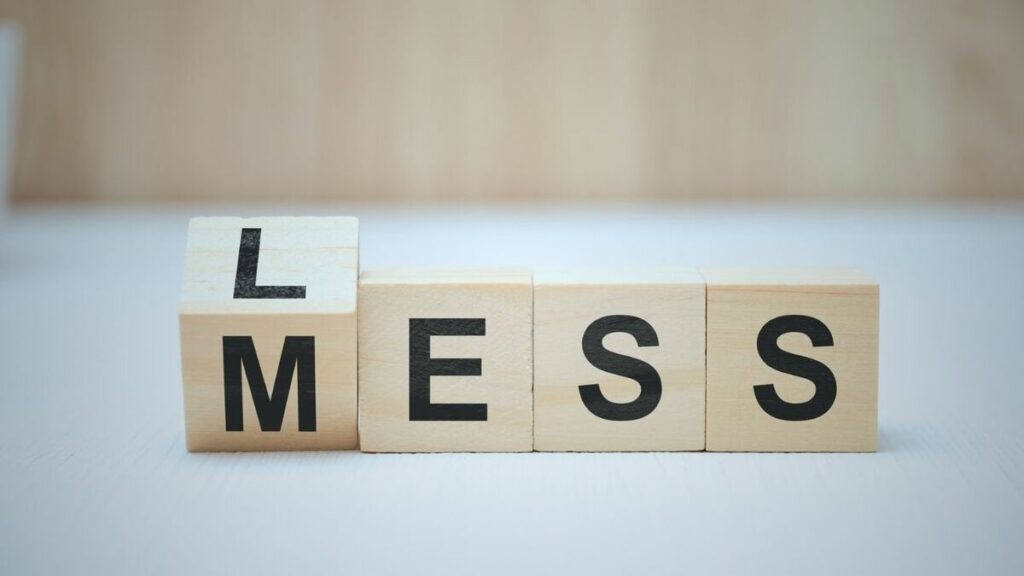
When someone says to you “it’s time to declutter” it can conjure up emotions of panic.
But decluttering your book collection can have many benefits.
Not only does it free up valuable space in your home, making a more open and less cluttered environment, but the act of cleaning can release endorphins which is the same ‘feel-good’ feeling you get from exercise.
One of the benefits of a clean, tidy, and uncluttered space is it helps you to feel happier and less stressed – clean living, clean mind.
Decluttering also allows you to re-evaluate your reading interests and focus on the books that truly matter to you.
When decluttering, you may find books you haven’t read in years that you had forgotten about. Discovering gems that you want to reread.
Or perhaps you discover books that you didn’t know you had.
Letting go of books doesn’t mean ultimately letting go of the past and making space for new experiences and knowledge.
Ways to Declutter Books Without Throwing Them Away
Now you know a little bit about why you should declutter your books, it’s time to look at the ways you can do that…
1. Sort your books into categories

Whether you arrange books by genre, color, or alphabetical order, organizing your books into a category is the first step to decluttering as it allows you to see what you have in your collection.
In doing this, I found that I had books I had never read and never planned on reading, books I didn’t like and wouldn’t read again, and for some reason that I’m still not sure of, I had two copies of Harry Potter and the Chamber of Secrets.
When sorting your books, there are many different ways you can go about this. My personal method is to organize my books into piles using an acronym I invented: T.O.S.S.
T – Trash: This is anything that is clearly garbage or unrepairable. These can be put into a new pile to be turned into something new (more on that later).
O – Outdated: Items that are no longer useful or relevant to your life. These are the books you are most likely never going to read again, and can be put to one side.
S – Sentimental: Things that you rarely use but have sentimental value to you. These should be categorized and put to one side.
S – Similar Items: Duplicate items or things that serve the same function can be reviewed and put into a pile.
Once you have those books put into piles, you can start organizing your books.
Related reading: Are some of your books looking a little dirty? Here are some top tips for how to clean your books.
2. Create a reading corner
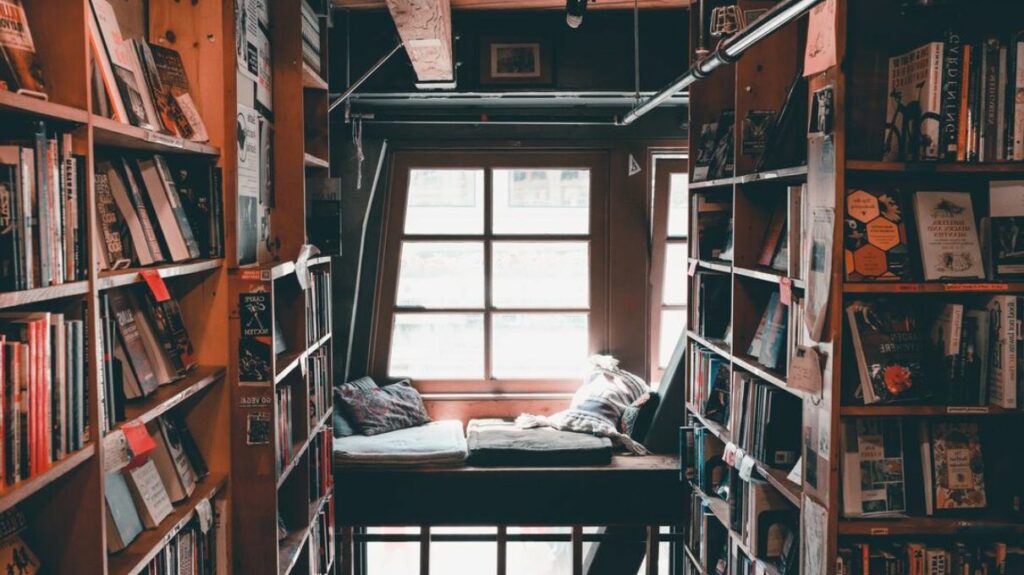
If you’re in a situation where you have more books than space for them, it may be time to upgrade your bookshelf to a reading corner.
You might be thinking you don’t have space in your house for a library and that’s where a reading corner is the perfect in-between space.
It’s a place where you can keep your books, and have a space where you can sit and comfortably read without distractions.
Reading corners can be anything from a seating area under your stairs with some shelves, to a window seat with shelving underneath the seat, to a small corner in your living room.
Pinterest is a great place to start finding ideas and inspiration for reading corners. But if you don’t have time to start scrolling, here are some reading corners ideas that I liked to get you inspired.
3. Digitize your books
If you have books that you love but don’t want to throw them away because you think you will reread them, then you might want to digitize them.
When the Kindle first came out in 2007, I rejected it because I felt there was nothing better than a paperback book. However, I eventually gave in and bought one, and the main reason for that was because of space. And I haven’t looked back ever since.
If you don’t want to purchase the Kindle edition for every book you own, you can use a book scanner. These are devices that allow you to scan pages and digitize them in bulk.
Of course, you would need to ensure that the scans of your book are private and you do not distribute them anywhere, as this would infringe some copyright laws.
Read more: Advantages and Disadvantages of Ebooks
4. Book crafts
If you have books that you don’t want to read again, but don’t want to throw them away, turn them into something new.
Here are some ways in which you can turn an old book or a discolored or yellowed book into something new and unique:
- You can create unique Christmas ornaments, wreaths or decorations.
- You can turn a book into a secret storage container to hide priceless belongings.
- You can make origami with the pages and turn them into bunting (which would look great in your new reading corner).
- You can paper mache a lampshade.
- If you have a duplicate copy of a book you love, you can cut out your favorite quotes and put them into frames.
Or perhaps my favorite thing to do with old books is to…
5. Turn your hard books into a book stand
I started doing this as soon as my bookshelf filled up. If you stack all your hardbacks on top of each other, it can make a pretty solid table on which you can put light items or a small lamp.
I don’t recommend you do this with paperbacks as they are not sturdy enough to stack high enough for a table, and you also want to make sure you choose books that you don’t plan on reading, but it does create an interesting feature in your home.
Every time people come to my house, they always comment on my table and say “oh, that’s a good idea.”
6. Use bookshelves or storage with adjustable shelves
When decluttering, it’s not about creating more space, but about using space in better ways.
Rather than buying more bookshelves and taking up more room in your home, look for a bookshelf that has adjustable components that are designed to create more space as your collection grows.
For example, instead of buying a traditional bookshelf, you can buy separate boxes and stack them on top of each other, like this:

I started doing this with apple crates because it looks really rustic and shabby, and suited the decor of my house better.
Though apple crates are quite small and bulky, so it’s not a long-term solution. But I do think it looks really cool in a kitchen as a place to store cookery books.
7. Lend books to friends or family
If you need a temporary solution while you fix the long-term problem of freeing up space, then lend your books to your friends or family.
This not only helps you to declutter the space but also gives them an opportunity to read the books you love, and then you can have conversations about it once they have read it.
Be sure to remember to ask for them back.
8. Donate books you don’t want anymore

I know I said that this would be a guide about decluttering without throwing them away, but donating is not throwing out.
We can all find books that we don’t want or need anymore, even if it’s just one or two.
You can donate to your local charity shops, homeless shelters, your local library, or even your local school (assuming it’s age appropriate).
Not only do you help out those who are less fortunate, but you also get a great feeling from giving.
It can be scary to donate books and know you are not going to see them again, but knowing there is someone out there who is going to benefit from your donation is one way to sleep easy afterward.
9. Create a special collection of books that have sentimental value or hold special memories
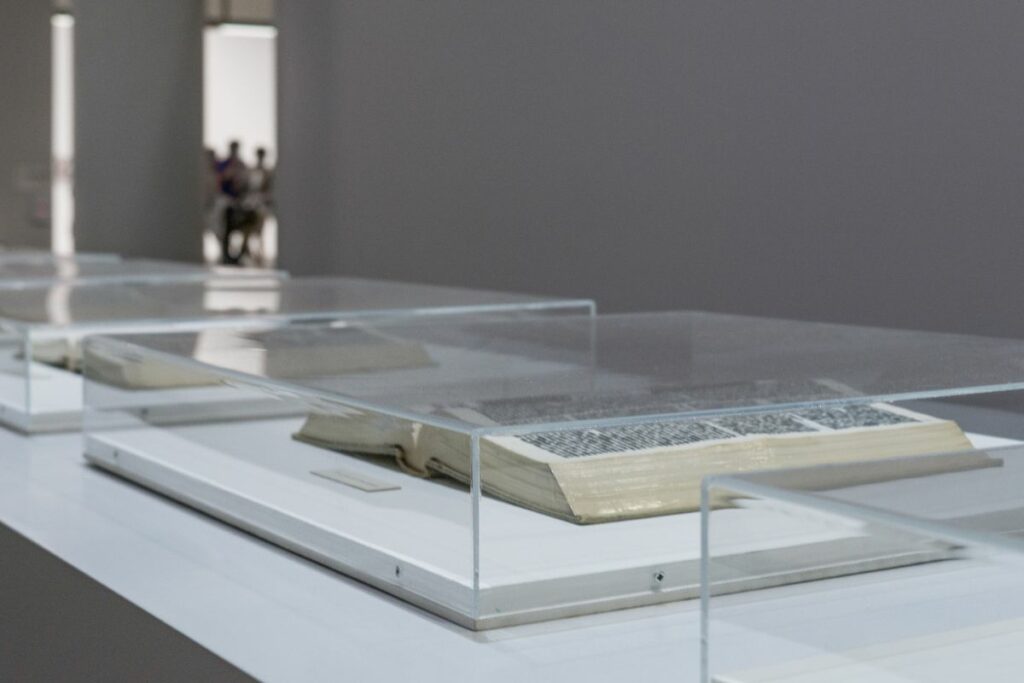
If you have a selection of books that mean a great deal to you, then maybe they deserve a space that is as special as they are.
Perhaps they were a gift from a relative who passed, or they are a special edition copy, or they are signed by your favorite author, whatever the reason if you want to ensure your books last a lifetime, they will need extra protection.
Books age naturally and over time, the pages start to darken and brown. This is because the paper is made from wood, and exposure to oxygen turns the color of pages.
Now I’m not suggesting you get a glass case and suck out all the oxygen, but you can lengthen the life of your special books by sealing them away in a glass cabinet where dust, moisture, and other particles that might damage them can’t get in.
Ways to Ensure Your Books Don’t Get Cluttered Again
Now you have in your mind some ways to start rearranging and reorganizing your books, I just wanted to share some advice to help make sure your home doesn’t get cluttered again.
1. Adopt a new mindset
One of the reasons why my books get cluttered in the first place is because I have anxiety about getting rid of them.
I won’t bore you with my life story, but books have always been a place of peace for me. Books offer me comfort, an escape from reality, and a friend.
It feels wrong to throw away something that had given me such solace.
But then I remembered; they are not people, they are books.
I had to stop thinking of my books as objects with feelings. I had to stop being sentimental over anything made of paper that I could easily digitize and still enjoy later on.
The fear of decluttering was starting to seep into other areas of my life. Heck, I wouldn’t even throw away the Chinese takeaway menus.
If you don’t find a way to be at peace with removing things in your life that you don’t need anymore, even small things like books – how hard will it be to remove things that are bigger? Such as a bad relationship or a toxic friendship.
The hardest thing about decluttering is changing that mindset, so don’t be hard on yourself if you struggle at the beginning.

This is why I wanted to write this guide about ways to declutter without throwing books away.
Consider this guide your baby step.
2. Create a limit for the number of books you keep
This is more advice for ensuring your decluttered books stay that way. While you are sorting through your books (assuming you followed step one) you will probably find a lot of books you haven’t read yet.
If you’re someone who is guilty of buying more books before reading the ones you have (no judgment, that’s me too) then perhaps it’s time you get tougher with yourself.
Create healthy boundaries with yourself. Whether it’s limiting book purchases to just one a month or cutting off buying any until you get through your pile, then this is a great way to limit the book clutter from getting out of control again.
3. Create a separate shelf for books you haven’t read yet
If you have been able to sort through your books and find all the ones that you are still yet to read, find a space for them that’s separate from your collection.
Don’t just put them back on the bookshelf, or they won’t get picked up again.
Find a box, or a separate shelf, where you can keep these books separate.
4. Create a system to determine which books never get picked up
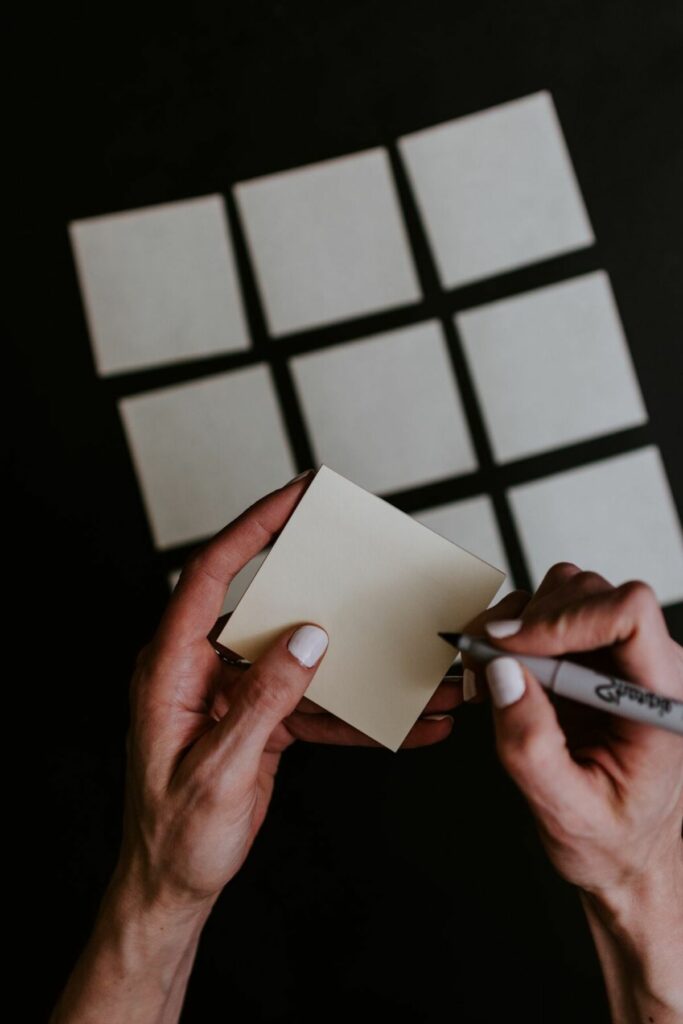
If you’re someone who rereads their books, then you might benefit from having a system in place to determine which books on your bookshelf are dead weight.
Once you’ve figured out which books don’t get touched, you can start to declutter just those books, which will save a lot of time and energy.
Here are some ways you can separate the wheat from the chaff on your bookshelf.
- After you’ve read a book, put them on a special shelf that you consider your “read in the last year” shelf.
- Put a sticky note or bookmark in the books you’ve read in the last year.
- Check for books that are still in their original packaging or wrapping.
- Look for books that are still in pristine condition with no signs of wear and tear.
- Get a printable reading tracker and keep a record of the books you have read in the last year.
- Use a book-organizing app like Libib or Goodreads to keep track of books you’ve read and ones you haven’t.
- Organize your books by the date you acquired them and see which books you’ve had for a long time but haven’t read.
Like this post? Don’t forget to save it on Pinterest.
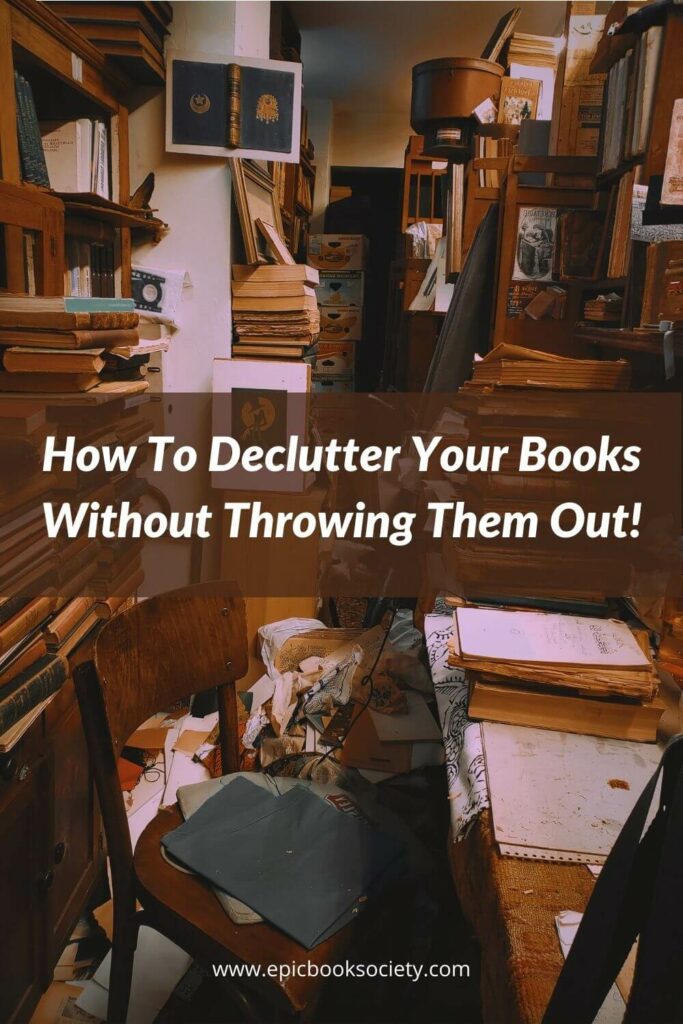
Before You Go
This concludes my guide on how to declutter a bookshelf without throwing books away.
I hope that it gave you some inspiration and ideas for ways you can reorganize your books and live a happier life without the mess.
If you have any more tips or ways to declutter a bookshelf, please let me know in the comments.

